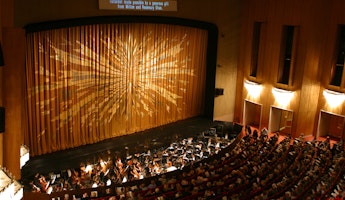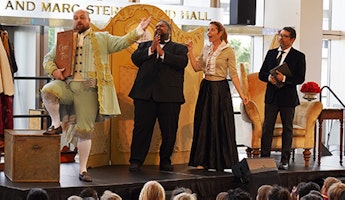Blog
February 21, 2024
Celebrating Compelling Black Composers
If asked to quickly name a famous classical composer, odds are you would name a white European man. While the contributions of giants like Mozart, Verdi, and Puccini can’t be denied, the classical world is also filled with women and composers of color. In honor of Black History Month, allow us to introduce a few of our favorites (and maybe yours as well).
Joseph Bologne, Chevalier de Saint-Georges
To describe Saint-Georges (1745-1799) as a composer would be an understatement. He also was a virtuoso violinist, an exceptional conductor, an accomplished military officer and a champion fencer. His achievements in all those fields would take too long to list, so we just want to focus on his compositions. He crossed paths with Mozart, a decade his junior, who was still a plucky up-and-comer when Saint-Georges was enjoying great success.
Born in 1745 in the French colony of Guadeloupe, Saint-Georges was the illegitimate son of a wealthy plantation owner and an enslaved African woman. His father formally acknowledged him, gave him his surname, and at the tender age of seven, sent him to study in France, where his musical career would blossom. In 1773, he became the conductor of what would soon become the most prestigious orchestra in Paris. He is known to have performed for and with Marie Antoinette, who admired his talents. He missed out on an opportunity to take over as director of the Paris Opera when certain company members objected to the idea of being led by a person of color. Not one to wallow in despair, Saint-Georges concentrated on composing and leading his new orchestra.
Some of his operas of note are Ernestine, The Hunting Party and The Anonymous Lover. Of his six operas, the only one that has survived in full is The Anonymous Lover, which we had the pleasure of presenting in a streamed performance in November 2020. He also composed several concerti for violin, as well as for clarinet and bassoon, symphonies, sinfonia concertante, string quartets and other chamber music pieces—though not all of it has survived. Some academics, including French journalist Alain Guédé, believe that Saint-Georges' works were banned from performances and even burned to erase his legacy following Napoleon Bonaparte’s re-establishment of slavery in France. Regardless, Saint-Georges is still remembered today, and his accolades and accomplishments remain some of the most impressive ever in the classical world.
William Grant Still
We’ve talked at length about William Grant Still (1895-1978) in preparation for our upcoming opera Highway 1, USA but we’re happy for any opportunity to help spread his legacy. Dubbed “The Dean of African American Composers,” Still broke multiple barriers during his career. He was the first African American to:
- Conduct a major American symphony orchestra
- Have and opera produced by a major opera company
- Have a symphony performed by a leading orchestra
- And to have an opera performed on national television
Still’s style also incorporated multiple African American music genres into the classical space, including spirituals, jazz, and blues, creating an eclectic tapestry of sounds.
Still was an incredibly prolific composer, with almost 200 works to his name. These include nine operas, five symphonies, four ballets, and over thirty choral works. While his music may have gone under appreciated and underperformed at the time, his legacy is attracting more attention every year, and we can’t wait to welcome Highway 1, USA to our stage for its long-awaited LA premiere.
Florence Price
Our next boundary-breaking composer, Florence Price (1887-1953), was the first African American woman to be recognizes as a symphonic composer as well as the first to have a composition played by a major orchestra.
Price was a prodigy, giving her first piano performance at four years old, having her first composition published at 11, and graduating as valedictorian of her high school at 14. She then went on to double major in organ and piano teaching at the New England Conservatory of Music, where she also wrote her first-string trio and symphony.
She ultimately composed over 300 works including four symphonies, four concertos, multiple chamber music works, and around a hundred songs. Dozens of her scores were thought to be lost until they were rediscovered in 2009 at her abandoned summer home, and her music has since returned to the concert hall. Just like Still, Price combined multiple Black genres into her music and was especially popular in Chicago where she lived. Through her career highs, Price dealt with inescapable racism and sexism: many critics saw her as a novelty act and focused on her performing abilities more than her compositional skills. She responded with her signature stoicism, requesting that any reviews of her work be free of bigotry. Her blending of genres and upfront approach to social issues made her a pioneer among both Black and female composers.
George Walker
Our list concludes with yet another prodigy. George Walker (1922-2018) began his piano journey at the age of five and won admittance to the Oberlin Conservatory at just 14. He received his doctorate from the Eastman School of Music at the University of Rochester and began a professorship at Rutgers University, but his most notable accolade was doubtlessly becoming the first African American to win the Pulitzer Price for Music.
His 1996 composition Lilacs is set to Walt Whitman’s poem “When Lilacs Last in the Dooryard Bloom’d" for soprano and orchestra, and was first performed by soprano Faye Robinson with the Boston Symphony Orchestra under the baton of Seiji Ozawa. The piece has been performed in recent years by superstars like Latonia Moore and Nicole Cabell (as well as our very own Young Artist alumna Tiffany Townsend). He remains one of the most prolific American composers in history, being elected to the American Academy of Arts and Letters in 1999 and inducted into the American Classical Music Hall of Fame just one year later. Though he passed away in 2018, he is survived by two sons, violinist and composer Gregory T.S. Walker and playwright Ian Walker.








/03-cosi/_dsc0996_pr.jpg?format=auto&fit=crop&w=345&h=200&auto=format)















